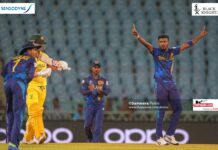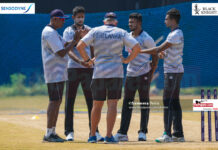They are leaders who back their instincts and make spur of their moment decisions; they are masterminds who are used to each of their decisions, some made in split seconds, coming under the microscope for long examinations. The captains of four teams face their most challenging few days, calmly plotting a route through to the ICC Cricket World Cup 2015 crown.
India’s Mahendra Singh Dhoni, who has been in such a situation and navigated successfully to the title four year ago, the two co-hosts’ captains Michael Clarke and Brendon McCullum and South Africa’s AB de Villiers who has made history by becoming the first from his country to lead his team to victory in a World Cup knockout game are worthies in their own right.
Each of these men has steered his team past the first hurdle in the playoffs and needs two more wins to emerge champion. How they fare over the next eight days in the Russian roulette should not determine how posterity will judge them or alter the legacy they will leave in cricket. But they will be the first to admit that their decision-making and motivating skills will be on test.
Clarke has had his share of problems this season, not just with injuries but also with selectors. But he has shown a remarkable ability to walk the tightrope by focussing on drawing the best out of the 11 men picked by the selectors. There was risk involved in his decision to bring Glenn Maxwell back into the attack against Misbah-ul-Haq on Friday but he was rewarded.
Clarke proved that he is not afraid to stick his neck out in finding the best combination of bowlers. For instance on Friday, he kept Mitchell Johnson away from the new ball and Josh Hazelwood rewarded him with the wicket of Pakistan opener Ahmed Shehzad in his third over. Johnson came up with a large-hearted response.
Dhoni has done really well on the field, marshalling his bowling resources superbly and tinkering with the batting order only when the situation has so demanded. He sends in Ajinkya Rahane at No. 4 if India have lost a couple of early wickets and Suresh Raina at that spot if there has been a partnership that ends only sometime before batting Powerplay.
The Indian captain, who has earned the respect of his opponents for being an intuitive skipper, has managed the bowling really well, given Bhuvneshwar Kumar’s lack of form. He has encouraged Umesh Yadav, Mohammed Shami and Mohit Sharma to bowl fast and bounce batsmen out, assessing their rhythm on the day and making the chances accordingly.
McCullum brings a bit of a gambler’s touch to leading New Zealand, embracing an all-out attack policy. He has backed his instinct not only when at the crease but also in goading other batsmen to ensure that the team has large totals to defend or chases down targets ruthlessly. Their bowlers have been as aggressive and brilliant echoing their skipper’s approach.
South Africa’s de Villiers is another who has led by example, getting his team to respond with intensity and purpose. Morne Morkel, for instance, bowls from a reduced run up to ensure that de Villiers does not cop another fine and risk sitting out of a game. The Proteas’ skipper has never hesitated in appreciating or being critical of his team-mates.
The captain of each semifinalist is proud of his team, aware of its weaknesses but letting his players express themselves without any inhibitions. None of them has spent time lamenting the absence of any player due to injury or non-selection he would have liked to be a part of his team. Instead, they have drawn the best out of those available at their disposal.
Dhoni backed left-handed opener Dhawan despite a string of failures, de Villiers helped wicket-keeper de Kock to remain in the side, McCullum had a key role in managing veteran left-arm spinner Daniel Vettori’s return from injury while the tale of Clarke’s disciplined and determined recovery from a hamstring surgery is nothing short of inspirational.
Over the next eight days, these skippers will have the opportunity to make their leadership skills count even more. Their instinct, their gut feel, their reading of the game situation, their understanding of their rivals’ plans and their ability to get their own men to execute their plans will play a key role in deciding which of them lays his hands on the coveted trophy.
Which of them will take the risks that pay off? Which of these men will risk and fail?
















